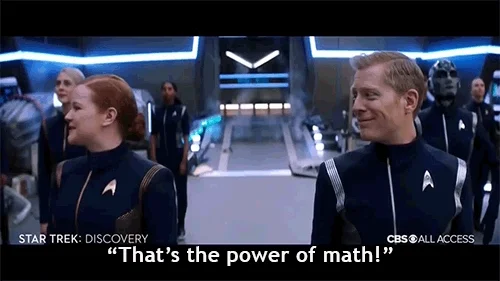
This logo isn't an ad or affiliate link. It's an organization that shares in our mission, and empowered the authors to share their insights in Byte form.
Rumie vets Bytes for compliance with our
Standards.
The organization is responsible for the completeness and reliability of the content.
Learn more
about how Rumie works with partners.
You're in math class when you realize...

If this is you, you're not alone. Many students struggle in math, and it's no wonder — understanding abstract concepts can be a challenge. It takes practice and patience to do well in math, so what can you do to make it easier?
These 5 strategies will help you not only get good grades but boost your confidence in math class!
#1: Take math notes efficiently
In class, your teacher will guide you through each math concept and provide examples using a specific formula or theory. Take careful notes when the teacher is going over key points so you can reference them later.

If you already know what lesson will be taught the next day, preview that chapter in your textbookandtake note of the concepts and formulas beforehand. That way, you can focus on important points your teacher demonstrates rather than what is already in the book.

Take note of:
Formulas and equations
The process of solving a specific problem (steps involved)
Examples solved step-by-step
Tips that can help you solve a problem
Something not specified in your textbook
Questions you may have so you can ask your teacher later
#2: Memorize and understand formulas
Most math concepts have a formula that helps you solve a problem. Break down these formulas to understand when they're used and why. Take note of the formula itself and provide examples as to how you should use it.
Having a strong foundation and knowing how to use formulas in different contexts are important because math builds upon itself.
Understanding the "when" and "why" of each formula will help you in your current math unit and with advanced topics.


Enhance your understanding of a formula by:
Memorizing the name of the formula andthe formula itself
Knowing when you can and can't use it
Jotting down examples with a step-by-step breakdown
Writing down ways in which the formula can be manipulated orhas more than one way of expression
#3: Practice sample problems
Math is heavily focused on application, so solve sample problems to practice using a specific formula or theory. You can get these problems from your notes, textbook, homework, or by looking online.


When solving math problems, aim to:
Solve it on your own first before referencing the textbook or answer key
Have a variety of problems (different numbers, varying lengths, increasing complexity, word problems)
Make your work as neat as possible (showing your work step-by-step)
Have an answer key available so you can check if you're correct
Take your time to avoid making simple mistakes or skipping steps
Quiz
Why might it be important to keep your work as neat as posisble? Select all that apply.
Keeping your work neat will make going back to your work a lot easier as everything will be in order. In case you need to ask your teacher for help, you can more clearly reference specific steps or areas of confusion. Keeping your work neat will also help you avoid making simple mistakes like skipping steps or using a wrong number. Although keeping your work in order might encourage you to skip steps, it's not a wise thing to do since it would be hard to follow your thinking if there is a sudden gap between one step and another — and you don't know what process happened in between.
#4: Ask for help
If you're stuck on anything — a concept, an equation, or how and why a problem should be solved in a specific way — reach out for help. It's important to seek clarificationbecause math builds upon itself and will become increasingly complex.

If you struggle to understand something now and don't ask for help, you risk falling behind and becoming more confused. Reach out to teachers, classmates, tutoring centers, family members, and friends if you need support.
There's nothing wrong with asking for help! You're deepening your understanding of a complex subject, and you should be proud.

When should you ask for help? Reach out to someone if you're:
Looking for ways to start solving a problem
Still trying to grasp the concept
Stuck on a specific problem/step
Trying to understand how/why a specific formula is used
Checking your work for simple mistakes
Did you know?
Asking for help doesn't mean asking for the answer. Bounce ideas around and clarify your "hows" and "whys" so that you learn the process and understand the concept. Avoid skipping steps and jumping to the answer because you will end up asking the same questions in the future.
#5: Search the web for tutorials
If you need additional support outside of the classroom or want to learn a concept in a different teaching style,look up online tutorialsto solve a specific math problem or concept.
These tutorials often feature a teacher breaking down sample equations and explaining how to solve them.


Key advantages of using online tutorials include:
Learning through a variety of teaching styles
Pausing and re-visiting partsof a video/learning module
Practicing sample questions
Access to forums or comment sections to ask questions
Accessibility outside of the classroom
For support divided by grade level and content, check out sites like Khan Academy and OnlineMathLearning.com. You can also look up keywords on YouTube (ex. "linear equations") for tutorials and mini-lessons.
Did you know?
Some websites offer interactive models and games to help you understand a math concept in context!
Take Action
Math is a complex subject, and the learning process may be challenging.
However, once you understand the "hows" and "whys" of a concept and begin to answer more math problems correctly, your confidence will grow, and you may find yourself wanting to tackle the next big thing.

These 5 tips are about more than just learning how to get good grades. They'll help you improve your math skills overall!
To set yourself up for success in math class:
This Byte has been authored by
Emily Nguy
Science Teacher